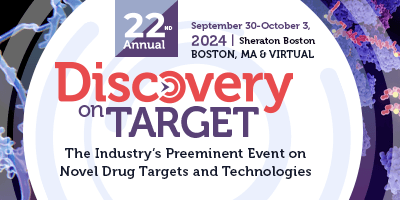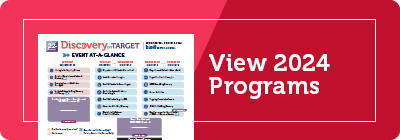対面式分科会
対面式の分科会(ブレイクアウト)は、司会者付きのインフォーマルな討論会で、参加者が特定の議題に関するアイデアや意見を交換し、将来的な協力関係を構築できる場です。ファシリテーターが各々の討論会を主催し、議事の円滑な運営と全グループの参加とに努めます。この形式を最大限に活用するためにも、ご自分の研究成果を取りまとめた上で、この集団での問題解決セッションに参加し、アイデアを積極的に交換しましょう。
全ての分科会(水曜日のDiversity Discussionを含む)は、対面形式でのみ開催されます。
PART A CONFERENCES: 10月1日(火)2:50-3:35 PM
Degraders and Molecular Glues - Part 1
Tackling Transcription Factors and Other Difficult-to-Drug Targets
Moderators:
John Brognard, PhD, Senior Investigator, Laboratory of Cellular & Developmental Signaling, National Cancer Institute, National Institutes of Health
Wankyu Lee, PhD, Senior Research Scientist, AstraZeneca Pharmaceuticals
Peng Wu, PhD, Professor, Chemical Physiology, Scripps Research Institute
- When to classify a target as being challenging or difficult?
- How to find tools and assays that will work with challenging targets?
- Examples of how difficult targets are being pursued using new approaches and modalities
Structural and Mechanistic Characterization of Degraders and Glues
Moderators:
Ralph Mazitschek, PhD, Assistant Professor, Harvard Medical School; Co-Director of the Chemical Biology Platform, Center for Systems Biology, Massachusetts General Hospital
Hua Xu, PhD, Director, Mechanistic Biology & Profiling, AstraZeneca
- In vitro characterization to develop new degrader/glue modalities
- Developing assays that are sensitive and unbiased in finding the right targets and ligands
- Overcoming limitations in current biochemical and cellular assays
Lead Generation Strategies
Affinity Selection-Mass Spectrometry (AS-MS) for de novo Hit Generation and DEL Hit Verification
Moderators:
Allen Annis, PhD, Independent Consultant, former SVP Research, Aileron Therapeutics
Hans-Peter N. Biemann, PhD, Distinguished Scientist, Integrated Drug Discovery, Sanofi
- AS-MS and DEL as synergistic tools for hit generation and verification of on- and off-DNA hit structures
- Where does AS-MS fit in the HTS toolbox vs. DEL and other biophysical/biochemical screening technologies?
- How do we access AS-MS for hit-finding and verification? Outsourcing options vs. in-house platform development
Hit Validation Strategies
Moderator: Mitchell H. Keylor, PhD, Associate Principal Scientist, Merck
- Eliminating false positives
- Data analysis formats
- Binding methods: How important is it? Favorite biophysical tools?
Small Molecules for Cancer Targets (3:05-3:35 pm)
Covalent Approaches for Drug Discovery
Moderator: Paul E. Gormisky, PhD, Senior Director, Enabling Sciences Chemistry, Odyssey Therapeutics
- Strategies to prioritize targets for covalent drug discovery
- Assessing if a covalent ligand or fragment for a novel target can be progressed to a drug (e.g., sufficient pocket, supportive biology)
- Role of covalency in other new modalities (degraders, macrocycles)
Antibodies Against Membrane Protein Targets
Avoiding Roadblocks: Maneuvering the Challenges of Difficult Targets
Moderator: Joseph Rucker, PhD, Vice President, Research and Development, Integral Molecular, Inc.
- Antigen design: antigen strategies and engineering for optimal target presentation
- Antibody sources: pros and cons of naive and immune libraries, and the benefits of using divergent species for targets that are highly conserved
- Screening: best approaches to identify diverse antibody panels, and merits of B cell cloning vs. display technologies
- Specificity: how to assess off-target binding
Small Molecules Targeting RNA
Challenges and Opportunities in Pursuing RNA as a Drug Target
Moderators:
Generoso Ianniciello, Chief Business Officer, Anima Biotech
Karthik Iyer, PhD, Director, Head of Medicinal Chemistry, Arrakis Therapeutics
Marla Weetall, PhD, Senior Vice President, Pharmacology and Biomarkers, PTC Therapeutics
- Emerging techniques for probing and modulating RNA
- Correlating RNA binding with function and physiological response
- Designing and optimizing small molecules targeting various RNA moieties
- Leveraging AI/ML, RNA degradation tools and other drug development strategies
AI/ML-Enabled Drug Discovery - Part 1
How to Quantify Biology to Inform AI/ML-Driven Decisions in Drug Discovery
Moderators:
Arvind Rao, PhD, Associate Professor, Department of Computational Medicine and Bioinformatics, University of Michigan
Yuan Wang, PhD, Head of Research Analytics, UCB Pharma
- Improving training sets and building better AI/ML models
- Using deep learning, neural network analysis and imaging for drug discovery
- Using large language models to help translational research and decision-making
- Novel machine learning models for hit-finding and structure-activity predictions
Physiologically Relevant Translational Models
Standardization of Complex in vitro Models (CIVMs) in Drug Development
Moderators:
Linda Griffith, PhD, Professor, Biological Engineering & Teaching Innovation, Massachusetts Institute of Technology
James Hickman, PhD, Professor, NanoScience Technology Center, University of Central Florida
Stephanie Kourula, PhD, Principal Scientist, Johnson & Johnson Innovative Medicine
Lindsay Tomlinson, PhD, Global Pathologist Resource Lead, Pfizer Inc.
- Opportunities and/or needs for standardization of in vitro models/microphysiological systems (MPS)
- Ways to increase model utilization in the context of regulatory decision-making
- Readiness of CIVM/MPS models for gaining acceptance in drug development
- Drafting broadly applicable standards that can be applied regardless of context-of-use (COU) and/or organ system
PART B CONFERENCES: 10月2日(水)5:15-6:15 PM
Diversity Discussion (Sponsorship Opportunity Available)
Fostering Diversity through Mentoring
Moderators:
Naytia Byrd, Manager, Human Resources, Ovid Therapeutics, Inc.
Saudat Fadeyi, PhD, MBA, Director, Business Development, Ovid Therapeutics, Inc.
Fred Manby, DPhil, Co-Founder & CTO, Iambic Therapeutics
Joel Omage, Research Scientist II, CVM Disease Area, Novartis Institutes for BioMedical Research, Inc.
Andrew Zhang, PhD, Director, Chemical Biology, AstraZeneca
Join us for this interactive, informal, candid discussion on embracing and increasing diversity in the life sciences. We have invited some engaging speakers to share their stories and experiences on understanding the importance of mentoring. How can we improve diversity-gender, racial, economic, and others-by being a mentor and reaching out as a mentee? As a group, we can share various initiatives that have been launched in different environments and discuss how well they have worked. We are hoping that this event will motivate the audience to learn, think, and execute on ways to improve diversity in their own environments. This discussion will not be recorded nor available for on-demand access.
Topics for discussion will include, but certainly not be limited to:
- How to increase awareness and address hidden barriers and biases in life sciences
- How to motivate early-career scientists to seek out mentors and resources
- How to convince senior leadership to take time for coaching the next generation of leaders and support DEI initiatives
- How to create simple and impactful opportunities and metrics for mentors and mentees to connect and collaborate
PART B CONFERENCES: 10月3日(木)10:20-11:05 AM
Degraders and Molecular Glues - Part 2
Novel Modalities, E3 Ligases and Ligands for Induced Proximity
Moderators:
Tauseef Butt, PhD, President & CEO, Progenra, Inc.
Rick Ewing, PhD, Vice President and Head of Chemistry, Rapafusyn Pharmaceuticals
- Technologies enabling future induced proximity work
- Improving potency, modularity and utility of degraders and glues
- Discovery and validation of new degrader chemistries and functionality
- Pursuing new E3 ligases and cellular pathways
- Red Flags in PROTACs and Pink Flags in molecular glues
Discovery and Optimization of Molecular Glues
Moderators:
Yong Cang, PhD, Professor, ShanghaiTech University; Co-Founder & CSO, Degron Therapeutics
Susanta Samajdar, PhD, CSO, Aurigene Discovery Technologies Ltd.
- From induced proximity to glues
- Strategies to identify and screen molecular glues
- Value of serendipitous discovery versus rational design
- Determination of selectivity of molecular glues
- Importance of species selectivity for degraders
Target Identification Strategies
Leveraging Covalent Chemistries, Phenotypic Screening, Chemoproteomics Tools
Moderators:
Alexander Federation, PhD, Co-Founder & CEO, Talus Bioscience
Denise Field, PhD, Senior Principal Scientist, Chemical Biology and Proteomics, Pfizer
Andrew Zhang, PhD, Director, Chemical Biology, AstraZeneca
- How can proteomics be best used in the drug discovery pipeline?
- Can traditional chemoproteomics and orthogonal methods help deconvolute “undruggable” targets?
- What improvements are needed in developing good proteomic assays and screening platforms?
- Leveraging covalent chemistry and induced proximity for drug discovery
GPCR-Based Drug Discovery
Peptide Agonists for GPCRs
Moderator: Florence Brunel, PhD, Senior Principal Scientist, Novo Nordisk Inc
- How will small molecule GPCR agonists compete with peptides?
- What are the next GPCRs to be blockbusters?
- What is the limitation to developing more peptide GPCR agonists? What are the new techniques to help solve these issues?
Innovations in GPCR-Hit Discovery
Moderator: Evan O'Brien, PhD, Postdoctoral Scholar, Laboratory of Brian Kobilka, Molecular & Cellular Physiology, Stanford University
- Role of cryoEM
- Impact of AI
- DNA-Encoded Libraries (DEL) & GPCRs
- New biophysical tools: SPR microscopy, single-molecule FRET
Cancer Antibodies
Strategies for Enhancing Antibody Efficiency and Selectivity
Moderator: Thomas Nittoli, PhD, Senior Director, Therapeutic Proteins, R&D Chemistry, Regeneron Pharmaceuticals, Inc.
- Improving tissue penetration and targeting
- Reducing immunogenicity and off-target effects
- Optimizing antibody-drug conjugate design and development
Targeting Transcription Factors
Leveraging Novel Strategies for Transcription Factors and Undruggable Targets
Moderators:
Kristy Stengel, PhD, Assistant Professor, Department of Cell Biology, Albert Einstein College of Medicine
Asad Taherbhoy, PhD, Director, Drug Discovery, Foghorn Therapeutics
William Tansey, PhD, Ingram Professor of Cancer Research, Professor of Cell & Development Biology, Vanderbilt University
Pamela Ting, PhD, Associate Director, Hematology, Novartis Institutes for BioMedical Research
- Assays and screening strategies to identify modulators of transcription factors
- Structural and mechanistic approaches for underlying mechanism of action
- Emerging transcription factors as viable drug targets for the various indications
- Designing potent, orally bioavailable drugs that target co-activators and inhibitors
- Pursuing degradation as a therapeutic strategy for targeting transcription factors
AI/ML-Enabled Drug Discovery - Part 2
How Successful Are AI/ML Approaches in Drug Development Today?
Moderators:
Shruthi Bharadwaj, PhD, Global Lead, Digital & Analytics, R&D Global Operations, Sanofi
Sean Gardner, MS, Scientific Program Manager, Office of Special Initiatives, NCATS, National Institutes of Health
Dmitri Kireev, PhD, Professor, Department of Chemistry, University of Missouri
- How to develop AI/ML models able to predict outcomes that matter most (activity in animal models and, ultimately, in clinics)?
- Can AI/ML make drug discovery more deterministic?
- Is AI useful in improving the efficiency of virtual screening?
- What support does this field need in order to thrive and succeed?
Using AI/ML for Lead and Target Discovery
Moderators:
Barak Akabayov, PhD, Professor, Department of Chemistry, Ben Gurion University of the Negev
Diane M. Joseph-McCarthy, PhD, Professor of the Practice, Biomedical Engineering, Boston University
Petrina Kamya, PhD, Global Head of AI Platforms, Vice President Insilico Medicine; President, Insilico Medicine Canada, Insilico
Harpreet Saini, PhD, Senior Director, Informatics, Astex Pharmaceuticals Ltd.
- Areas where AI is highly impactful in drug discovery pipeline
- Explainable/interpretable AI to understand model predictions/decisions
- Strategies for reducing chemical search space
- Scalable visualization techniques for large-scale data, e.g., single-cell data, spatial omics, cell-painting
* 不測の事態により、事前の予告なしにプログラムが変更される場合があります。
スポンサー更新
講演者・スポンサー更新
スポンサー更新
講演者・スポンサー更新






